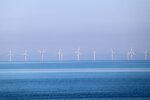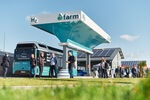12/28/2009
USA - Another wind power alternative: The wind energy glider
Can you harness the wind to run your farm or your manufacturing plant? Imagine flying a kite-like invention to do just that. Would that be an invention from a founding father or a modern-day entrepreneur? I found out at the recent New Hampshire High Technology Council's Entrepreneur Forum.
A presentation was given by my pal Dimitri Cherny, who blew us away (forgive the pun) with Highest Wind. Check this out, Highest Wind deploys a 10-foot by 30-foot kite called the energy glider tethered to a 30-foot aerie or base. When the wind picks up, the energy glider flies upwards of 1,200 feet into the sky. The energy glider communicates via RF radio frequency to the power trailer below containing a capstan, motor reel and flywheel connected to a generator converting wind to up to 100,000 kWh of usable energy directly to the grid.
What's more, it's a portable unit on a trailer that can be hooked to a pickup truck, assembled on site, deployed, or moved. A few other factoids: These units can be up and running in a few hours, generates 30 kWh in only 7 knot winds where traditional wind turbines require 17 knots. Where farmers use $34,000 per year of electric power for a 300-cow farm, Highest Wind would deliver a 5-year payback. The target market is rural areas and farmers, which are seen as the ideal candidates. Why not harness the wind and help farmers too?
The New Hampshire High Technology Council's Entrepreneur Forum includes a presentation in front of a panel of experts and live audience at First Place in Manchester. The esteemed panel included Dr. David Olinger, associate professor, Worcester Polytechnic Institute; partner, energy practice leader and Harvard Law School graduate, attorney Curt Whittaker of Rath, Young & Pignatelli; and Jack Clarke, chairman, Homeland Renewable Energy.
Olinger legitimized the fact that wind energy has been studied in-depth at technical universities and that he felt that Highest Wind's IP is in the control system. His concerns were lightning strikes and the energy glider's response to abrupt changes in wind direction, and Ekman spirals, if you will.
Whittaker recommended that liability and warranty are two key areas to make sure to have your tail feathers covered since the energy glider could glide into something or somebody, heaven forbid. Whittaker brilliantly recommended that Dimitri use a fleet vehicle business model to sell lots of units and attract large Wall Street-type investors. This would enable aggregation of tax credits, energy credits and liability insurance. Or, aggregate the energy and sell it at a discount. Rural electric co-ops, now that's something a farmer can get his head wrapped around. I buy my hay, feed and power at the co-op. Think and sell beyond individual farmers, farm-by-farm. Go fleet, baby! Become the Hertz of distributed wind. Now that's brilliant!
Clarke, who also owns a farm, by the way, was encouraging in stating wind energy has a role, takes time, and will mature. Highest Wind can help. He noted investors tend to mimic the behavior of lemmings, running off a cliff en masse, after a hot tip rather than digging into innovative approaches to this huge issue of alternative energy. His sage advice was to partner with a university, take advantage of grants and continue to improve the research and extend the state-of-the-art in portable wind energy devices. He was equally intrigued and offered his farm as a beta site.
For more information please contact Trevor Sievert at ts@windfair.net
A presentation was given by my pal Dimitri Cherny, who blew us away (forgive the pun) with Highest Wind. Check this out, Highest Wind deploys a 10-foot by 30-foot kite called the energy glider tethered to a 30-foot aerie or base. When the wind picks up, the energy glider flies upwards of 1,200 feet into the sky. The energy glider communicates via RF radio frequency to the power trailer below containing a capstan, motor reel and flywheel connected to a generator converting wind to up to 100,000 kWh of usable energy directly to the grid.
What's more, it's a portable unit on a trailer that can be hooked to a pickup truck, assembled on site, deployed, or moved. A few other factoids: These units can be up and running in a few hours, generates 30 kWh in only 7 knot winds where traditional wind turbines require 17 knots. Where farmers use $34,000 per year of electric power for a 300-cow farm, Highest Wind would deliver a 5-year payback. The target market is rural areas and farmers, which are seen as the ideal candidates. Why not harness the wind and help farmers too?
The New Hampshire High Technology Council's Entrepreneur Forum includes a presentation in front of a panel of experts and live audience at First Place in Manchester. The esteemed panel included Dr. David Olinger, associate professor, Worcester Polytechnic Institute; partner, energy practice leader and Harvard Law School graduate, attorney Curt Whittaker of Rath, Young & Pignatelli; and Jack Clarke, chairman, Homeland Renewable Energy.
Olinger legitimized the fact that wind energy has been studied in-depth at technical universities and that he felt that Highest Wind's IP is in the control system. His concerns were lightning strikes and the energy glider's response to abrupt changes in wind direction, and Ekman spirals, if you will.
Whittaker recommended that liability and warranty are two key areas to make sure to have your tail feathers covered since the energy glider could glide into something or somebody, heaven forbid. Whittaker brilliantly recommended that Dimitri use a fleet vehicle business model to sell lots of units and attract large Wall Street-type investors. This would enable aggregation of tax credits, energy credits and liability insurance. Or, aggregate the energy and sell it at a discount. Rural electric co-ops, now that's something a farmer can get his head wrapped around. I buy my hay, feed and power at the co-op. Think and sell beyond individual farmers, farm-by-farm. Go fleet, baby! Become the Hertz of distributed wind. Now that's brilliant!
Clarke, who also owns a farm, by the way, was encouraging in stating wind energy has a role, takes time, and will mature. Highest Wind can help. He noted investors tend to mimic the behavior of lemmings, running off a cliff en masse, after a hot tip rather than digging into innovative approaches to this huge issue of alternative energy. His sage advice was to partner with a university, take advantage of grants and continue to improve the research and extend the state-of-the-art in portable wind energy devices. He was equally intrigued and offered his farm as a beta site.
For more information please contact Trevor Sievert at ts@windfair.net
- Source:
- Online editorial www.windfair.net
- Author:
- Posted by: Trevor Sievert, Online Editorial Journalist
- Email:
- ts@windfair.net
- Link:
- www.windfair.net/...
- Keywords:
- wind energy, renewable energy, wind turbine, wind power, wind farm, rotorblade, onshore, offshore









